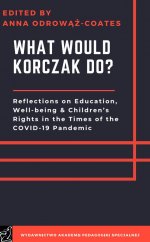
What would Korczak do?
Omschrijving
In 2004 the UNESCO/Janusz Korczak Chair in Social Pedagogy was established at the Maria Grzegorzewska University in Warsaw. Since 2006 the UNESCO Chair has organized International Summer Schools aimed at researchers, academics and educators from all around the world. The themes of the summer schools change and evolve, but we always ensure that we draw from our university’s roots. The holding of yearly UNESCO Summer Schools has led to the development of a special publication series under the patronage of the Polish Commission for UNESCO and the UNESCO Chair. The series pertains to the issues of inclusion, human rights, child rights and childhood studies, and is financed by the Maria Grzegorzewska University. In the series we aim to promote contributions from the so-called Global South, as we feel it is underrepresented in global discourses. We also embrace the concept of global Englishes, promoting diversity and flexibility of the English language as a tool of communication for inclusive international dialog.
The current COVID-19 pandemic situation forced us to move the 13th International Summer School online, offering a virtual tour of Korczak’s philosophy of education and the virtual tour of Warsaw, the city of Korczak, in his footsteps. Studying Korczak in his own socio-cultural space, entrenched in historic and political context of his home city, is the only way to fully immerse in his thought and to gain a deep understanding of the heritage left for the future generations of children, their tutors, parents and researchers of childhood. Communicating from the virtual city of Warsaw is an experimental form of maintaining the context and the circumstances that Korczak lived and worked in. Korczak is a prominent figure in children’s rights development and represents an important part of Eastern and Central European heritage. He was also an insightful observer and researcher of childhood and early childhood development (Odrowaz-Coates, Vucic 2017) and the universality of Korczak’s ideas from over a century ago, continue to make his contribution to children’s rights development relevant and inspiring. We want to reach out from the hub of his child-centric educational philosophy to other parts of the world, to find connections and commonalities for greater unity and cooperation in bringing children’s rights to the forefront of political discussions.
In the face of the pandemic, UNESCO (2020) has provided an immediate response to the humanitarian crisis arising from the spread of the virus and has provided solutions and resources for continuation of education, focusing on the issues of access and WHO (2020) provides guidelines and reliable health and safety information daily. Governments of the world have combatted the situation in many different ways, sometimes reaching a united front, sometimes amplifying differences and the discourse of ‘otherness’. In this complex new reality, we wanted to hypothesise what Korczak would do and explore the situation for vulnerable groups around the world, in the context of inclusion and well-being.
The last few months have brought enormous changes to the lives of many people in the world, including children and adolescents. In many cases, the situation of those already affected by conflicts, poverty, domestic violence, illness and many forms of inequality, has worsened with new restrictions and imperfect solutions, created ad hoc due to the sudden nature of events. We observe spontaneous social forces emerging in order to support those most vulnerable. We see many positive formal and informal initiatives; solidarity is the key word for surviving this situation and the maintenance of humanity and sanity.
Although it is not the same situation that Henryk Goldshmidt (Janusz Korczak) found himself in at the brink of WW2, his philosophical and pedagogical heritage may be a goal for people supporting children and adolescents at the times of great uncertainty and insecurity. We therefore posed the following questions: what would Korczak do to address these difficult times? Whatwould Korczak do if he was involved in education, politics, healthcare and social work today? How would he view current social solutions and policy developments? How are children’s rights affected and how does the children’s rights framework work to combat difficult situations? Let’s take this challenge to see the world through the lens of this great global educator (Shner 2018) and read this selection of chapters written in 2020 by scholars and activists from 5 continents. In this volume dedicated to Korczak’s relevance in the global context, we present theoretical, empirical and practical contributions including essays, manifestos and thinking pieces. All papers refer to Janusz Korczak, his biography (Lifton 1988) or philosophical and educational heritage (Vucic 2017). The papers are embedded in children’s rights, children’s participation and empowerment.
